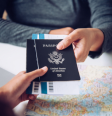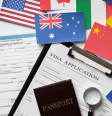 Only for Employer & Business Partners:- 9646934957 Email:- visa@oimc.in
Only for Employer & Business Partners:- 9646934957 Email:- visa@oimc.in
 info@oimc.in
info@oimc.in

Understanding Student Visas: Your Path to Studying Abroad
Studying abroad is an exciting opportunity that can enhance your education and broaden your horizons. However, to embark on this journey, securing the right student visa is crucial. This guide provides an in-depth look at student visas, including what they are, types, application processes, and essential tips for prospective students.
What is a Student Visa?
A student visa is a type of visa that allows international students to enter and stay in a foreign country for the purpose of pursuing their education. This visa typically grants the holder the right to study at a designated institution and may come with specific regulations regarding work, travel, and residency.
Types of Student Visas
- F-1 Visa (U.S.):
- Purpose: For full-time students attending accredited colleges, universities, and language programs in the United States.
- Duration: Valid for the duration of the study program, plus an optional 60-day grace period for departure.
- Work Options: Allows on-campus employment and, under certain conditions, off-campus work through Curricular Practical Training (CPT) and Optional Practical Training (OPT).
- Tier 4 (General) Student Visa (UK):
- Purpose: For students aged 16 and over who have been offered a place at an approved UK educational institution.
- Duration: Generally valid for the length of the course plus additional time depending on the duration of the study.
- Work Options: Allows limited work rights during studies and full-time work during vacations.
- Student Visa (Australia):
- Purpose: For international students enrolled in a registered course at an Australian educational institution.
- Duration: Valid for the duration of the course, with possible extensions.
- Work Options: Allows students to work part-time while studying and full-time during breaks.
- Student Pass (Singapore):
- Purpose: Required for international students studying in Singapore.
- Duration: Typically valid for the duration of the course.
- Work Options: Students may be allowed to work part-time under certain conditions.

Fill In The Required Form
To apply for a student visa, you typically need to have an acceptance letter from a recognized educational institution.

Submit Your Original Documents
ommonly required documents include your passport, visa application form, passport-sized photographs, proof of financial resources, and any additional paperwork specified by the embassy or consulate.

Get The Visa Resource Material
Proper preparation, thorough research, and timely submission of your application will greatly enhance your chances of securing your visa and achieving your educational goals.
A student visa is a type of visa that allows international students to reside in a foreign country while pursuing their education. The requirements for obtaining a student visa can vary significantly depending on the country you plan to study in. It’s important to start your application process early to ensure you meet all deadlines.
To apply for a student visa, you typically need to have an acceptance letter from a recognized educational institution. This letter proves that you have been accepted into a specific program and outlines the details of your course. Additionally, you may need to provide proof of sufficient funds to cover your tuition fees and living expenses during your stay.
Another essential requirement is demonstrating proficiency in the language of instruction, which is often English or the local language. Many countries require you to submit standardized test scores, such as TOEFL or IELTS, to prove your language skills.
You will also need to submit various documents during the application process. Commonly required documents include your passport, visa application form, passport-sized photographs, proof of financial resources, and any additional paperwork specified by the embassy or consulate.
Once your application is approved, you may have to pay a visa fee and attend an interview at the embassy or consulate. During the interview, officials may ask about your study plans, future goals, and how you intend to support yourself financially.
After receiving your student visa, make sure to familiarize yourself with the rules and regulations of your host country. Some countries have specific requirements for maintaining your visa status, such as attending classes regularly and maintaining a certain academic performance.
In conclusion, obtaining a student visa is a crucial step in your journey to study abroad. Proper preparation, thorough research, and timely submission of your application will greatly enhance your chances of securing your visa and achieving your educational goals.
Necessary Documents
We offer comprehensive employment services such as assistance with employer compliance.
- Research Requirements: Each country has specific visa requirements, including documentation and eligibility criteria. Check the official immigration website for detailed information.
- Obtain a Letter of Acceptance: You must have an acceptance letter from a recognized educational institution, confirming your enrollment.
- Prepare Documentation: Commonly required documents include:
- Valid passport.
- Completed visa application form.
- Acceptance letter from the educational institution.
- Financial proof (bank statements or scholarship letters) demonstrating your ability to cover tuition and living expenses.
- Health insurance documentation (if required by the country).
- Passport-sized photographs.
- Submit Your Application: Depending on the country, applications can often be submitted online or at the local embassy/consulate. Ensure all documents are complete and accurate.
- Pay the Visa Fee: Most student visa applications require a fee, which varies by country. Keep the receipt as proof of payment.
- Attend an Interview (if required): Some countries may require a visa interview. Be prepared to discuss your study plans and intentions.
- Wait for Processing: Visa processing times can vary, so apply well in advance of your intended start date.
- Receive Your Visa: If approved, your visa will be issued, allowing you to enter the country for your studies.
Visa Question Related to Immigration Process
In conclusion, obtaining a student visa is a vital step in pursuing your education abroad. It opens doors to new academic opportunities, cultural experiences, and personal growth. By thoroughly understanding the requirements and preparing your application diligently, you can enhance your chances of a successful outcome. Remember to stay informed about the specific regulations of your host country and maintain your visa status throughout your studies. With careful planning and commitment, your journey as an international student can be both rewarding and transformative, setting the foundation for your future career and life experiences.














